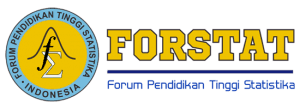PERBANDINGAN METODE AUTOREGRESSIVE INTEGRATED MOVING AVERAGE DAN METODE DOUBLE EXPONENTIAL SMOOTHING DARI HOLT DALAM MERAMALKAN NILAI IMPOR DI INDONESIA
Abstract
Keywords
Full Text:
PDFReferences
Armstrong, J. S. (ed.) (2001), Principles of forecasting: a handbook for researchers and practitioners, International series in operations research & management science, Boston, MA: Kluwer Academic.
Chang, P.-C., Wang, Y.-W., and Liu, C.-H. (2007), "The development of a weighted evolving fuzzy neural network for PCB sales forecasting" Expert Systems with Applications, 32, 86-96. https://doi.org/10.1016/j.eswa.2005.11.021.
Ekananda, M. (2016), Analisis Ekonometrika Dan Analisis Time Series, Jakarta: Mitra Wacana Media.
Enders, W. (2004), Applied econometric time series, Wiley series in probability and mathematical statistics, Hoboken, NJ: J. Wiley.
Hartati, H. (2017), "PENGGUNAAN METODE ARIMA DALAM MERAMAL PERGERAKAN INFLASI" Jurnal Matematika Sains dan Teknologi, 18, 1-10. https://doi.org/10.33830/jmst.v18i1.163.2017.
Heizer, J., and Render, B. (2014), Operations management: sustainability and supply chain management, Boston: Pearson.
Holt, C. C. (2004), "Forecasting seasonals and trends by exponentially weighted moving averages" International Journal of Forecasting, 20, 5-10. https://doi.org/10.1016/j.ijforecast.2003.09.015.
Mahmudi, M., Irwandi, R., Rahmadaini, R., and Fadhilah, R. (2018), "Meramalkan Laju Inflasi Menggunakan Metode Pemulusan Eksponensial Ganda" Journal of Data Analysis, 1, 12-20. https://doi.org/10.24815/jda.v1i1.11863.
Makridakis, S. G., Wheelwright, S. C., and Hyndman, R. J. (1998), Forecasting: methods and applications, New York: John Wiley & Sons.
Sedyaningrum, M., and Nuzula, N. F. (2016), "pengaruh Jumlah Nilai Ekspor, Impor dan Pertumbuhan Ekonomi terhadap Nilai Tukar dan Daya Beli Masyarakat di Indonesia" Jurnal Administrasi Bisnis, 34.
Sukirno, S. (2012), Makroekonomi: Teori pengantar, Jakarta: Raja Graffindo.
Wahyuningsih, N., Suprapti H., S., and Amutu, S. D. (2017), "Model peramalan Plywood PT. Linggar JatiMahardika Mulia" Malang: UIN Malang, pp. 52-57.
Wei, W. W. S. (2006), Time series analysis: univariate and multivariate methods, Boston: Pearson Addison Wesley.
Yaffee, R. A., and McGee, M. (2000), Introduction to time series analysis and forecasting: with applications in SAS and SPSS, San Diego: Academic Press.
Zivot, E., and Wang, J. (2006), Modeling financial time series with S-plus, New York, NY: Springer.
DOI: https://doi.org/10.34312/jjps.v1i1.5393
Refbacks
- There are currently no refbacks.
Copyright (c) 2020 Jambura Journal of Probability and Statistics

This work is licensed under a Creative Commons Attribution-NonCommercial 4.0 International License.







.jpg)






